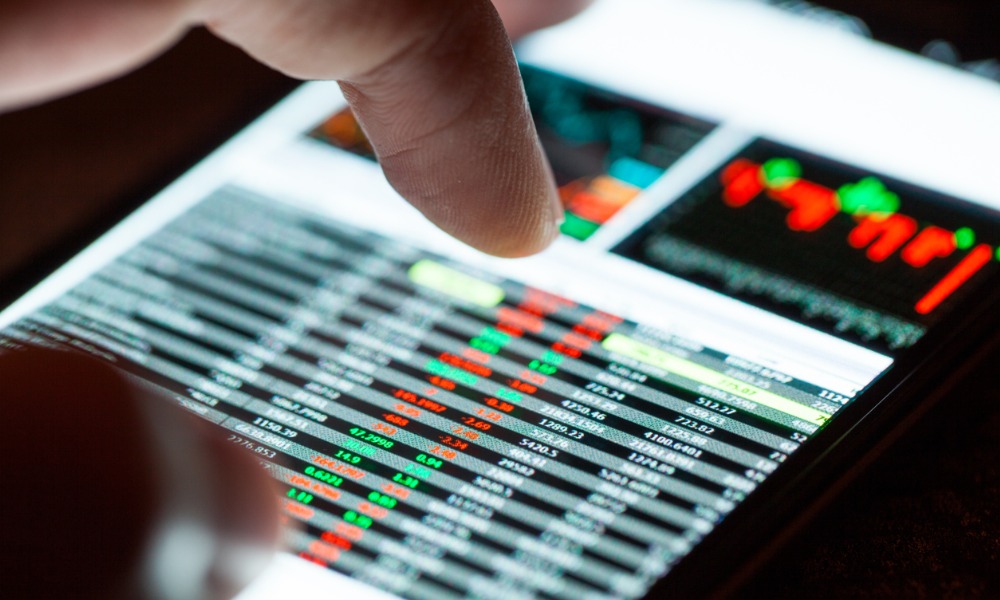Senior portfolio managers and advisors react after stark reality of the health crisis hit equity markets and bond yields

It felt like the week when sh*t got real for global markets. The coronavirus went from a benign headline risk that somebody, somewhere would eventually sort out to a worldwide health scare that is now dragging indexes down to worrying levels.
Stocks fell sharply after news the virus had spread to Italy, South Korea and Iran, raising concerns about its effect on global growth and business sector supply chains.
After reaching a record high on February 17, the S&P 500 Composite Index declined by 12%, as of February 27, suffering its first market correction since 2018. After a technical suspension on Thursday, the S&P/TSX Composite dropped 5% on Friday morning as Canadian stocks suffered.
In a blog post to investors, Tyler Mordy, president and CIO of Forstrong Global Asset Management, wrote that the “coronavirus choke hold is now fully tightened on global financial markets”. However, he urged investors to maintain the right perspective.
Mordy believes the economic impact from Covid-19 will be severe but not long lasting and that a combination of fear and misinformation has created a dangerous breeding ground for investor mistakes.
“The reality is that viruses and other epidemics, by definition, are not predictable,” he wrote. “The only line of defence here is to build robust, globally diversified portfolios. And, our current prescription is to actively avoid steady doses of apocalyptic porn and conspiratorial blog-spam.
“Yet, investing is still all about evaluating risk-return trade-offs. Investors are now debating whether the economic impact of the coronavirus crisis will be deflationary (i.e. a shock in demand) or inflationary (i.e. a shock in supply). What also matters is where markets are priced. Currently, most assets are priced for a protracted deflationary slump. Bond yields just hit new lows, with the Canadian 30-year government bond tumbling to an unbelievable low of 1.286%.
“Even before this week of carnage, 'deflationary winners' — US growth stocks and bonds — were a very crowded trade. Eternal stagnation is now fully in the price. This is a huge assumption. Even a small surprise at the margin in higher growth or inflation could lead to a rapid reversal in these crowded trades.”
Mordy added that the market is nowhere close to pricing in this scenario and believes this to be wrong, leading to a substantial reversal for several asset classes. Market corrections of this magnitude usually produce leadership changes, he added, and backed the “beaten-up” emerging markets stocks and other cyclically oriented assets to be the top candidates to take the lead.
John Christofilos, senior vice-president and chief trading officer at AGF Investments Inc., widened his scope to incorporate the latest rise to prominence of Democratic leadership front-runner Bernie Sanders. Whether it’s the coronavirus or the U.S., he believes volatility is here to stay – for individual stocks as well as the broader markets.
“We’re keeping a close watch on several indicators for signs of stability, including the U.S. 10-year treasury yield, which has fallen dramatically and will need to turn up before markets start to heal themselves,” he said.
“We are also paying close attention to safe havens like gold, as well as the Volatility Index (VIX). At least to date, we have not seen the kind of spike in volatility that would normally show us that we’ve reached a point of capitulation of stock prices.”
Meanwhile, Jody Jonsson, portfolio manager at Capital Group, said that it’s clear investors are now taking this virus outbreak much more seriously.
“The market is starting to consider what it means for global trade and travel. The bond market is worried about recessionary conditions in certain areas, including China, Japan and potentially Europe. The impact on the U.S. economy is harder to determine. In some ways, the impact is greater on certain companies outside of China — obviously, airlines and cruise companies fall into that category.
“But it’s also providing a boost to some industries, especially e-commerce and gaming companies. As more people stay home, you’re seeing massive increases in the consumption of home entertainment and online shopping activities.”
The company’s economist, Stephen Green, who is based in Hong Kong, believes things are actually a lot worse than markets initially thought.
He added: “The equity market is underpricing the supply chain disruptions that are now building. We still have a long way to go in terms of people getting back to work in the big cities, and local governments are under a lot of pressure to get their economies going again.
“When we’ve pressed our industry contacts about the timing of workers returning to manufacturing plants and offices, we have heard mid-March,” Green adds. “That is the base case. But I believe that hinges on the number of confirmed coronavirus cases in China continuing to come down and people gaining more confidence in those numbers and returning to work.”
From a global investment perspective, Capital believes it poses a potential threat to Europe’s fragile industrial recovery, with Germany the most exposed through trade links. France and Italy also have significant exposure to China through tourism, services and luxury goods. Japan, meanwhile, which is on the brink of another recession, is heavily dependent on China for intermediate goods that go into its manufacturing.
While the U.S. economy began 2020 in a much stronger position relative to the rest of the world — with very low unemployment, a robust housing market and a confident consumer — it is not immune to China’s slowdown and supply chain problems.
“If the virus spreads further and China’s manufacturing base in not fully functional by April or May at the latest, we could shave half a percentage point from U.S. GDP in the first half of the year,” Franz adds. “And if it lasts longer, the impact could be more severe in the second.”



